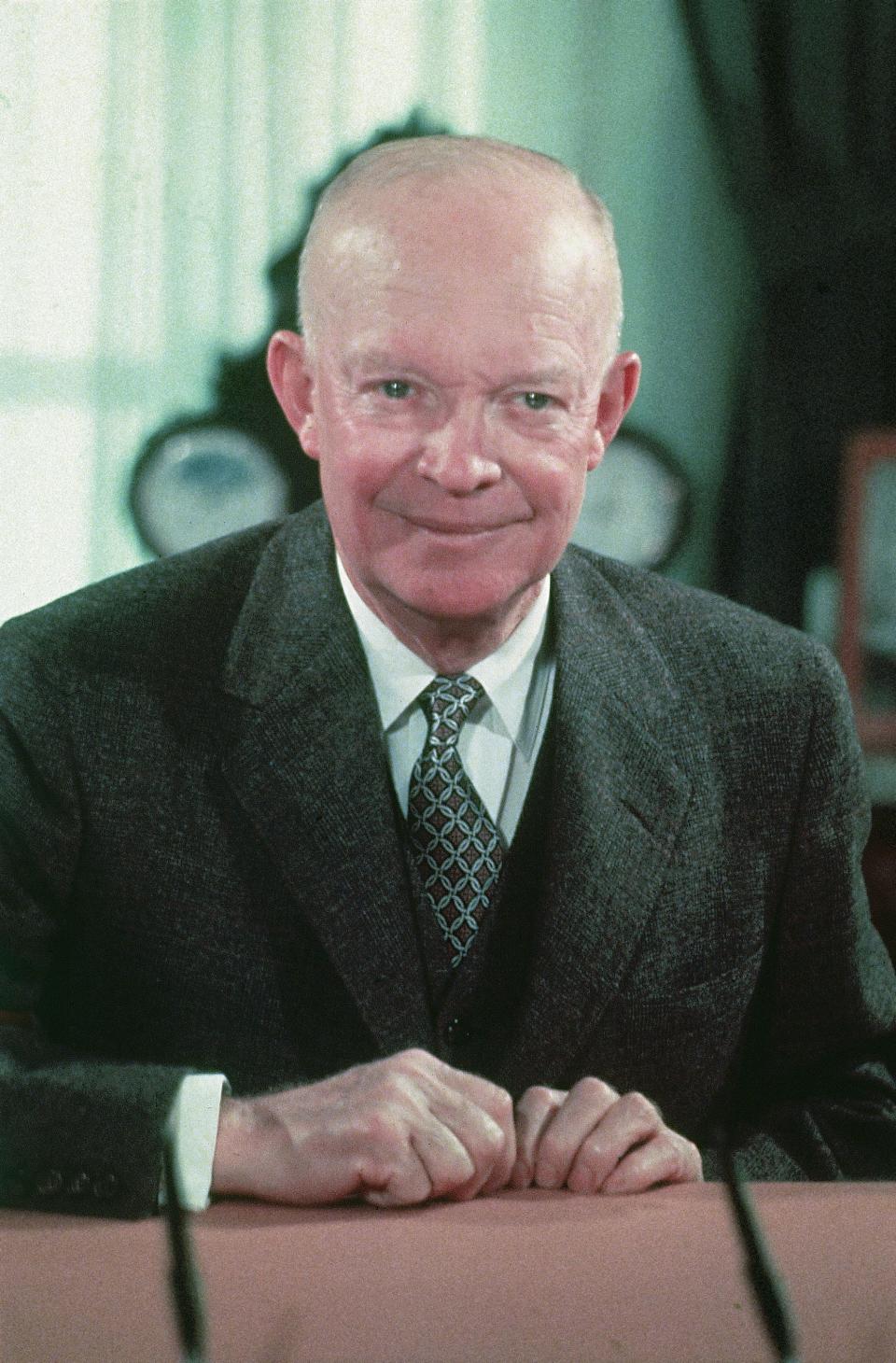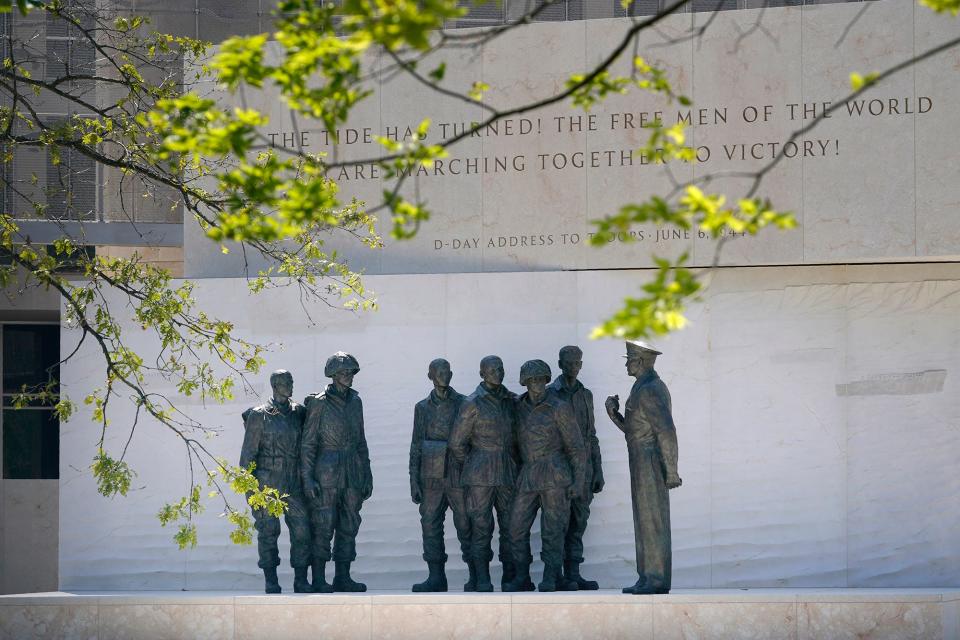The anti-Trump: Eisenhower was the right president for his time and would be for ours, too
A promise will be fulfilled this week with the formal dedication of a memorial for Dwight D. Eisenhower. Mandated by Congress in 1999 and designed by Frank Gehry, the dedication Thursday comes 75 years after Ike accepted the formal surrender of Wehrmacht forces to end the war in Europe and nearly six decades after he retired from serving two successful terms as the nation’s 34th president.
When Eisenhower died in March 1969, leading columnists said he was a poster boy for the American dream — the Kansas farm boy made good. But few contemporary observers much appreciated the degree to which that ordinary fellow from the heart of America, as Ike liked to describe himself, was a sly and effective politician whose prudent stewardship kept the nation prosperous and at peace during the 1950s.
Eisenhower was appreciated by average Americans in his own time for the good reason that he gave them a pause to absorb the steady New Deal/Fair Deal expansion of federal authority, by governing from the middle. Neither reactionary nor left leaning, Eisenhower’s approach can be characterized as pragmatic centrism — forward looking, steady, producing remarkable results in an era of divided government in Washington.
Eisenhower offered sense of security
At different times Ike described himself as a Jeffersonian Republican, a Wilsonian liberal or a “Modern Republican,” the latter being speechwriter Arthur Larson’s concoction. Whatever the brand, Eisenhower fit the temper of the 1950s, when millions of war veterans focused on building families and communities. Above all, they wanted to feel secure in order to pursue their American dreams.
On the cusp of the Eisenhower Memorial dedication, it is worth recalling what was distinctive about the 1950s and what lessons from the Eisenhower presidency are relevant in today’s political climate.
The sense of security Eisenhower offered was not based on building ever more expensive weapons or keeping unnecessarily large numbers of Americans in uniform, though it is true Eisenhower expanded rather than contracted the military-industrial complex. He was bent mainly on assuring the economic health of the nation through programs advancing infrastructure, health and education, new technologies, and strong support for STEM education, all tied to budget restraint.

When one tabulates Eisenhower’s legislative successes during his two terms, the list of impressive accomplishments includes the Interstate Highway System, the St. Lawrence Seaway, the creation of NASA, and the National Defense Education Act. Each has had lasting positive impact.
Eisenhower never perceived political opponents or the press as his enemy. He seems genuinely to have enjoyed his private sessions over bourbon and branch water with House Speaker Sam Rayburn and Senate Majority Leader Lyndon B. Johnson, both Democrats. His relationship with members of the White House press corps tended to be more correct than close, but he also was the first president to hold televised press conferences.
As a leader, Eisenhower was both tough and compassionate. In George Colburn's 1991 documentary about Eisenhower and the Cold War, "Dangerous Years," Richard Nixon spoke of deviousness as a regular tool in Ike's tool kit, and of his backbone of steel. Yet Eisenhower knew how to sustain morale on his White House team by praising those staffers who made good and by showing patience when they erred.
Trump's version of McCarthyism: Donald Trump's name-calling is an effective page from Joe McCarthy's bully playbook
Rather than fire valued subordinates who stumbled on occasion in performing their duties, oral histories show that Eisenhower assured them he always allowed his associates one mistake a year. When Federal Aviation Administration head Elwood Quesada inadvertently revealed an embargoed plan to the media, and made his way with a resignation letter to the Oval Office, the president clapped him on the back and told him to go back to work. Quesada later described in an oral history interview how the incident reinforced his loyalty to his boss and his commitment to his work.
Legacy of peace and prosperity
Eisenhower was a stickler for preparation. He believed that rapidly changing events made rigid adherence to fixed plans impossible, but planning made for needed flexibility. This helps explain Ike’s caution in assisting the French in Indochina in 1954 and his unflappability during the Suez and Hungarian crises in 1956. Both allies and enemies grasped this, which doubtless ratcheted back the potential for a nuclear exchange with the Soviet Union.

Washington Post editorial cartoonist Herbert Block (“Herblock”) cast Ike as consistently indecisive, whether the issue was McCarthyism or civil rights. In reality, he was fully capable of taking decisive action (as when he ordered federal troops to Little Rock in 1957 to protect nine black students trying to integrate a school). In 1954 Eisenhower quietly kneecapped the greatest demagogue of his time — Joe McCarthy — without Herblock or virtually anyone noticing his agency.
Eisenhower did not make all the right calls as president, but his percentage of right calls was high. He was the right president for his time. He left office with a budget surplus and the nation at peace. His winning smile and sunny personality reflected his era.
Vietnam veteran: As we approach 9/11, I think of my wartime service and America's lost values
But he also speaks to the present. Ike’s prescient warning about the “military industrial complex,” based on chastening experience, remains relevant. His emphasis on the importance of economic security as key to military strength, his belief in alliances (most especially so with European democracies), his concern for human dignity, his refusal to denigrate the critical press, mock or demonize political foes — these are qualities that make Eisenhower worth remembering as the nation dedicates a superb monument to his large legacy.
Michael J. Birkner, a professor of history at Gettysburg College, is the author or editor of several books on Eisenhower, including "Eisenhower’s Gettysburg Farm" (co-authored with Carol Hegeman) and "Encounters with Eisenhower: Personal Reminiscences to Mark collected to Mark the 125th Anniversary of the Birth of Dwight D. Eisenhower" (co-edited with Devin McKinney).
You can read diverse opinions from our Board of Contributors and other writers on the Opinion front page, on Twitter @usatodayopinion and in our daily Opinion newsletter. To respond to a column, submit a comment to letters@usatoday.com.
This article originally appeared on USA TODAY: Eisenhower Memorial: Trump is not like Ike, who was steady and prepared

